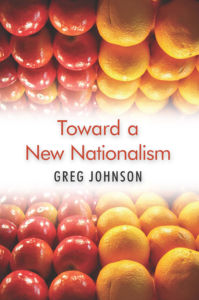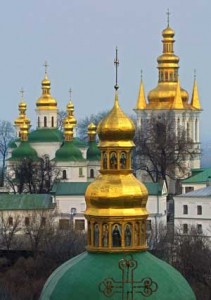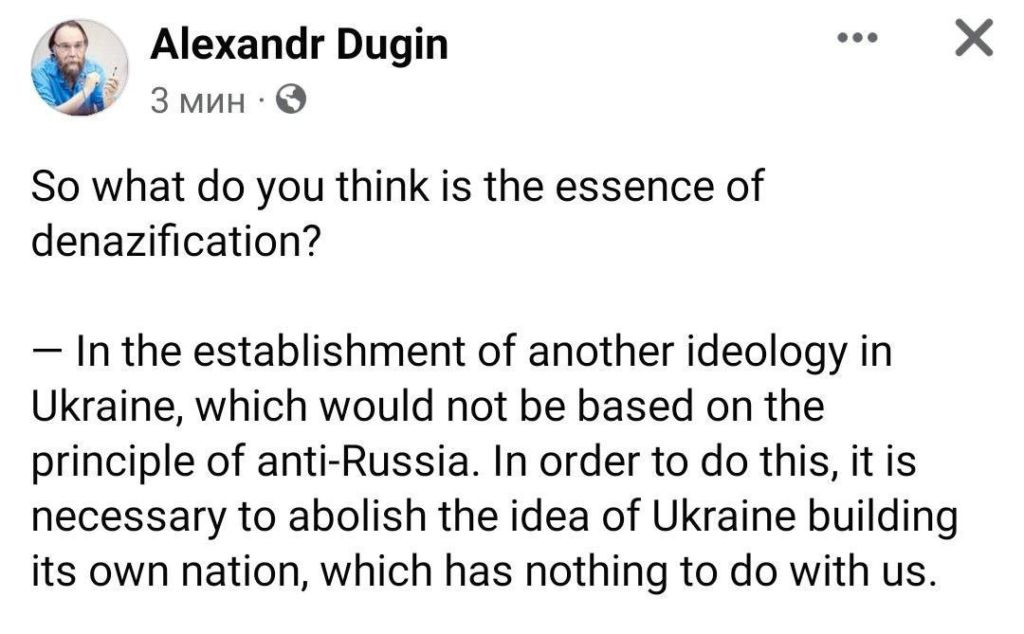What’s Really at Stake in Ukraine
Posted By Greg Johnson On In North American New Right | Comments DisabledCzech version here [2], French version here [3]
In my debate with E. Michael Jones on the Ukraine War, my opening statement [4] argued that nationalists in the West — and indeed, around the world — should support Ukraine against its invader, Russia. E. Michael Jones argued that Westerners should not support Ukraine.
Jones began with the history of Jews in Ukraine, apparently assuming that if Jews are involved with anything, it can’t be good. Then he argued that the war is really not between Russia and Ukraine but between Russia and America. There wasn’t a lot of substance to his argument, so I will address it only in passing while dealing with bigger issues.
I will grant that Jews are overrepresented in positions of power in Ukraine and the West, but they are also overrepresented in such positions in Russia. Thus there are Jews on both sides of this war, so no matter which side you take, you are going to end up agreeing with some Jews. Thus this war cannot be seen simply as Jews vs. non-Jews. You can’t explain the differences between two parties in terms of what they have in common. This war is about another, more fundamental clash between Russia and Ukraine that has polarized the Jewish community as well.
Is this an ethnic war between Ukrainians and Russians?
Ethnicity certainly plays a large role in the enmity between ordinary Ukrainians and Russians. But this explanation is not sufficient, either. The focus of the war has now shifted to East Ukraine, which has large ethnic Russian minorities, and where Russia and two breakaway puppet states, the Donetsk and Luhansk “People’s republics,” have been fighting Ukrainian forces since 2014.
But there, at the heart of the war, the conflict is not simply between Ukrainians and Russians. It is also between Russians and Russians. Ethnic Russians in the Donbas region are fighting against ethnic Russian separatists in Donetsk and Luhansk, who are aided by Russians from Russia as well as foreign antifa and Communists, some from the Third World. These separatist states are Russian military operations, controlled by Moscow. If Kyiv granted their independence today, they would be applying for union with Moscow tomorrow.
Furthermore, Russians from Russia herself have come to Ukraine to fight against Russia.
Why are Russians fighting Russians in Donbas? Why do Russians in Donbas not wish to be ruled by Moscow? The answer is complex. Based on conversations I had with Russians in Ukraine, both when I visited Ukraine in 2018 and later, by means of the internet, three reasons stand out.
First, some Russians see this as a war against Communism, plain and simple: the Communism of the Donetsk and Luhansk People’s republics and their foreign antifa fighters. They associate Communism with terror, death, and rule by scum. They don’t wish to submit to that.
This might not be the most sophisticated understanding of what is going on in Donbas. If you tell them that Putin is really behind the breakaway republics, they will simply tell you that KGB alumnus Putin is a Bolshevik as well. They don’t care if people are hoisting the Soviet flag out of nostalgia, irony, or red-brown fusionism. They think people who fly that flag and carry arms against them are the enemy and deserve to die.
Russian anti-Communists in Ukraine mock Western ethnonationalists who suggest that they should cede sovereignty to Communists on ethnonationalist principles, as if Communists are setting up ethnostates and wish to grant equal rights to Ukrainians to have their own state. Besides, where would that leave Russians who don’t want to be ruled by Moscow?
Second, some Russians are fighting alongside Ukrainians against Moscow and its proxies because they regard Ukraine as the cradle of their civilization, much as Americans, Canadians, and other Anglosphere-dwellers regard England and the broader United Kingdom. Just as Rightist Americans like T. S. Eliot were attracted to England because they felt that America was a fallen civilization — fallen away from important things still preserved at its source –, some Russians are attracted to Ukraine. Many Russians who come to Ukraine in particular reject the Byzantine and Mongol-influenced despotism associated with Moscow for the more egalitarian, free-spirited, nationalistic — and Western — political traditions associated with the Kievan Rus and later the Cossack hosts. Ukraine, whatever its faults, is a freer and more Western country than Russia, and some Russians gravitate toward that, seeing it as a part of their own heritage that has been lost in Russia.
Third, Russian ethnonationalists have taken refuge in Ukraine because they are persecuted in Russia. Putin’s Russia is a multiracial, multicultural empire [5], with an aggressively multicultural ideology. Russia is ruled by a small oligarchy that is visibly less ethnically Russian than the Russian Federation as a whole. It is worth looking at the “early life” sections of Russia’s richest men [6]: Jews, part-Jews, Uzbeks, Muslims from the Caucasus, Ukrainians, Byelorussians, and other non-Russian ethnic groups are all overrepresented. It is surprisingly difficult to find information on the ethnicity of Putin’s cabinet ministers (or their wives), but Defense Minister Sergei Shoigu [7] is half-Tuvan/half-Ukrainian, Foreign Minister Sergey Lavrov [8] is half-Armenian/half-Russian, and former Transport Minister Igor Levitin [9] is a Jew from Ukraine. If Russia put Russians first, this elite’s power and wealth would be threatened. Thus, just as in the West, the Russian oligarchy pushes multiculturalism and suppresses Russian ethnonationalism.
When Russian ethnonationalists complain that Russian birthrates are below replacement, whereas indigenous Mongoloid and Muslim populations are rising, the elites feel threatened. They don’t care about Russian ethnic interests. They care about maintaining peace among the different peoples of their empire.
When Russian ethnonationalists complain about being displaced by Muslim immigrants from the post-Soviet “Stans,” the elites feel threatened. Like Western elites, Russia’s rulers feel more secure if they can dilute the Russian majority with outsiders.
Russian ethnonationalists complain that the Russian military is increasingly reliant on non-Russians — Mongoloids and Muslims — who create ethnic mafias in the military and prey upon ethnic Russians. These troops are also more likely to commit war crimes than Russian troops (handy, if you treat war crimes as a tool of policy).
 [10]
[10]You can buy Greg Johnson’s Toward a New Nationalism here [11]
Russia’s rulers, however, have always recruited non-Russians for their military: under the Tsars, under the Soviets, and after the Soviets. This is an old tool of imperial statecraft. One creates an empire by sending one’s own people to die conquering other peoples. Obviously, rulers who do that can’t have a deep attachment to their own countrymen to begin with. One holds onto an empire by using conquered peoples to garrison other parts of the empire, including the “homeland,” since soldiers are more willing to kill people who don’t belong to their own ethnic group.
Empires also promote outsiders into their ruling elites. Thus Russia’s rulers have never been all that Russian, even under the Tsars, when the elites interbred with Mongols and then Germans. Bolshevism changed the ruling elite, filling it with peoples conquered by the Tsars: Jews, Georgians, Poles, Latvians, Ukrainians, and so on, as well as ethnic Russian Bolsheviks. But this new elite still feared the ethnic Russian majority and continued to play the old games of imperial statecraft to keep them subjugated. Even today, Russia’s multiethnic rulers are more afraid of ethnic Russians than they are afraid of Muslims and Mongoloids, so they don’t see an increasingly non-Russian military as a problem.
Russia’s military is just as wedded to “diversity, equity, and inclusion” propaganda as the Western military. Nationalists argue that this weakens the military. This is true, if one thinks of the military as primarily a tool to fight foreign wars. It is false, if one thinks a white military is a threat to the power of the elites and a diverse military is a handy tool to suppress the white majority. Our rulers and the Kremlin’s are united on this point.
This is why the oft-cited comparison of Russian and American military recruitment videos [12] is laughable. The Russian video features a tough, masculine white guy (who is reportedly a gay porn actor). This is contrasted with an American video about a female soldier with two mommies. Of course, the comparison is highly misleading, since American military recruiters also appeal to macho white guys [13] (and prepare them for the Great Replacement), and Russians have their own repulsive diversity propaganda [14]. The lesson we are supposed to draw is that our diverse army could never defeat an army of tough Russian white guys. The truth — as we have seen on the battlefield in Ukraine — is that the Russian army is not all that tough, not all that Russian, and not all that white. Russia’s army is as diverse and weak as America’s.
Diversity definitely is a weakness during war. But most of the time we are at peace, and during peace, imperial elites regard diverse armies as less threatening to their power than homogeneous ones.
Putin’s Russia, like America, is a multicultural, multiracial empire ruled by a rootless, sociopathic, and disproportionately alien elite that uses multicultural propaganda and race replacement as tools to suppress the white ethnic majority. Following the Jewish template, Putin stigmatizes all forms of ethnic nationalism as “Nazism” and uses the holocaust as a tool of anti-nationalist, pro-multiculturalist indoctrination.
In America, ethnonationalists are primarily being censored and deplatformed by private corporations. Such harassment is inconvenient, but not insuperable. In Putin’s Russia, however, ethnonationalists face harsh repression [15] and extrajudicial murder [16]. This is why many Russian ethnonationalists chose exile in Ukraine and are now fighting against Putin’s multiracial invaders.
If Russians and Ukrainians are fighting side-by-side against Moscow, this is not primarily an ethnic struggle. What, then, is the deep issue that unites Russians and Ukrainians against Moscow? The real issue is imperialism versus nationalism. Russian ethnonationalists, like Ukrainian ethnonationalists, don’t want to live under Moscow’s multicultural, multiracial, ethnocidal regime.
Russian ethnonationalists agree with the Russians who look to Ukraine and the West as a freer alternative to Russia’s Byzantine-Mongol despotism, but their deeper concern is that the Russian imperial machine is inimical to the very existence of the Russian people, expending their lives in imperial wars then using subject peoples to tyrannize over and ethnically displace them.
Even though Russia shed vast numbers of non-white subjects after the collapse of the Soviet Union and the secession of the various Stans, there are millions of non-Russians within Russia’s borders. Russians are about 80% of the current population, but their birthrates are below replacement, while the birthrates of non-Russians — most of them non-whites or Muslims — are above replacement. Russian ethnic decline is thus built into the current system, even without non-white immigration, which is also flowing in from the Stans. Beyond that, if the Eurasiansists have their way, Russia may well reabsorb some of the Stans. They are already pursuing extensive economic integration with Central and East Asia. None of this bodes well for ethnic Russians. Imagine what America would be like today if China, not Mexico, were on its southern border.
Russian ethnonationalists also agree with the anti-Communist Russians who took up arms against the separatists in Donetsk and Luhansk, but they think there is a deeper problem here than just the Communist ideology of the breakaway republics and their foreign fighters. Donetsk and Luhansk are simply Russian imperial operations. Their appeals to Marxism are just tools of Russian imperialism. The real enemy is the Russian imperialist mentality and machine, which are far older than Marxism and the USSR.
Although Putin follows the Jewish playbook of stigmatizing all forms of ethnonationalism as “Nazism,” some of the Russian ethnonationalists in Ukraine to whom I have talked really are National Socialists. It seems odd for Russians and Ukrainians to be attracted to National Socialism, given that Hitler aimed to reduce their peoples to helots and colonize their lands with Germans. But they reject Hitler’s petty chauvinism out of a sense of racial and civilizational brotherhood. They also typically bond over Black Metal music and mixed martial arts. Like ethnonationalists all over Europe, they are both committed to their own homelands and cultures and also feel deeply connected to our common race and civilization. These nationalists, both Russian and Ukrainian alike, don’t regard ethnic Russians as such as their enemies. Their enemy is Russia’s multicultural ruling elite and its imperialist mentality. This is a far more nuanced outlook than that of the average Russian or Ukrainian man in the street, who at this point hate one another intensely and regard “no more brothers’ wars” moralizing as daft. It sounds paradoxical, but Russian and Ukrainian neo-Nazis are far more capable of living and working together than Russian and Ukrainian normies.
The Ukraine War is a conflict between Russia, a multiracial empire with an aggressive multicultural ideology, and Ukraine, the homeland of the Ukrainian people. This conflict, in one form or another, has existed since the seventeenth century. It has existed longer than the United States, and would exist even if the United States were completely uninvolved. It is far older than NATO and would exist even if NATO were not involved. It would even exist if Jews were not involved. All these other parties are merely accidental, incidental, and along for the ride. If the United States, NATO, and the European Union were not offering aid to Ukraine, the Ukrainians would simply have courted other allies — because the real issue here is the old struggle between Russian imperialism and Ukrainian nationalism.
Imperial Russia has not just started a war against Ukraine. Russia has also vowed to “de-Nazify” Ukraine, which means destroying its national self-consciousness — basically anything that would prevent the Ukrainians who survive from being assimilated by Russia and disappearing from the pages of history. This is simply cultural genocide.
If you are fine with this because you think that Putin is conservative, Christian, reactionary, or illiberal, then you are not a nationalist who puts the preservation of our race and its distinct peoples above all else. Please come clean about this. Then let’s shake hands and part ways here.
In the war between imperial Russia and Ukraine, there’s only one side that genuine ethnonationalists — even Russian ethnonationalists — can support: Ukraine.
Because this conclusion is so blindingly obvious, Russia’s apologists try to reframe this conflict entirely. They claim that Russia is not fighting an imperial war of aggression against Ukraine. Instead, she is fighting a war of self-defense against America, which is “the real imperialist.”
* * *
Counter-Currents has extended special privileges to those who donate $120 or more per year.
- First, donor comments will appear immediately instead of waiting in a moderation queue. (People who abuse this privilege will lose it.)
- Second, donors will have immediate access to all Counter-Currents posts. Non-donors will find that one post a day, five posts a week will be behind a “paywall” and will be available to the general public after 30 days.
To get full access to all content behind the paywall, sign up here:
Paywall Gift Subscriptions
 [18]If you are already behind the paywall and want to share the benefits, Counter-Currents also offers paywall gift subscriptions. We need just five things from you:
[18]If you are already behind the paywall and want to share the benefits, Counter-Currents also offers paywall gift subscriptions. We need just five things from you:
- your payment
- the recipient’s name
- the recipient’s email address
- your name
- your email address
To register, just fill out this form and we will walk you through the payment and registration process. There are a number of different payment options.

